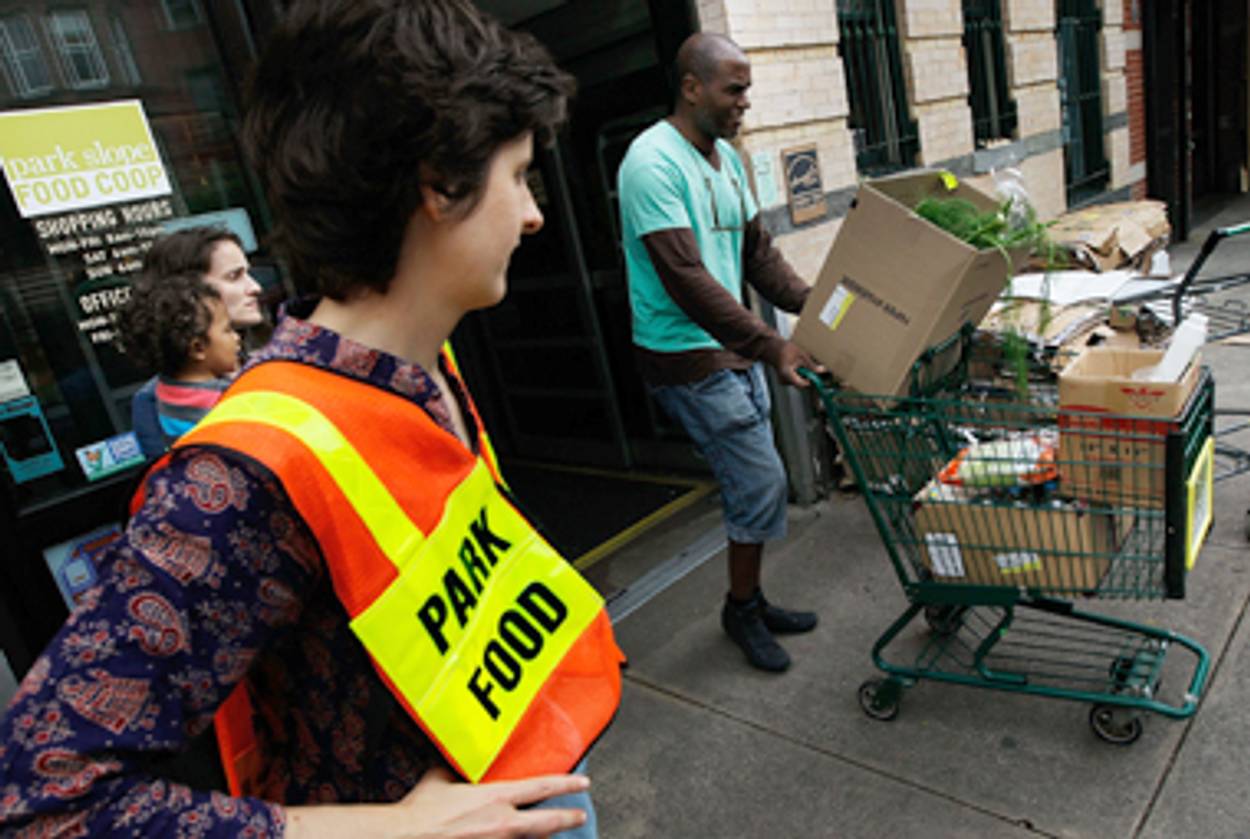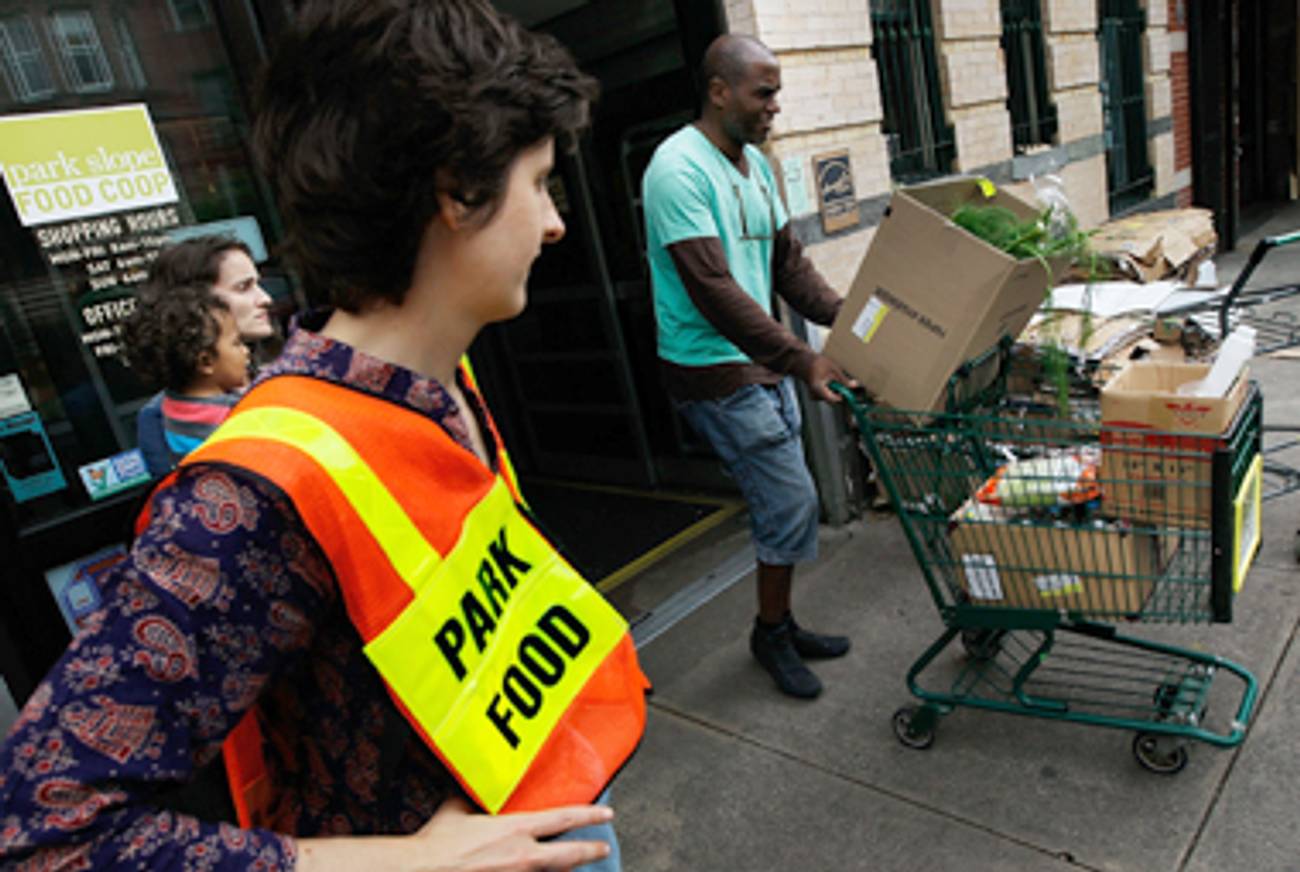Food Fight
A proposed boycott of Israeli products at the Park Slope Food Coop in Brooklyn, a 38-year-old grocery where political passions run high, is raising worries among its sizable Orthodox Jewish membership




Pity the Park Slope Food Coop. Drubbed almost annually by some crabby reporter in the New York Times, satirized by author Amy Sohn in her last novel, Prospect Park West, the 38-year-old cooperative grocery store in the heart of gentrified Brooklyn suffers from an image problem. The conventional wisdom is that it’s a bastion of smug bourgeois bohemians flitting around organic produce aisles in yoga pants, proclaiming their virtuosity on everything from international politics to composting. It’s an image that hasn’t been helped by the coop’s latest media storm: a proposal by a tiny cohort of members to have Israeli products pulled from its shelves.
In truth, the coop’s nearly 16,000 members are actually a varied bunch, representing a cross-section of Brooklynites seen in few places outside of the subway. Yes, many are like me: a white, liberal, college-educated parent who lives in brownstone Brooklyn. But the aisles are also populated by Rastafarians in knit hats, silver-haired women surviving on Board of Education pensions, artsy kids who live with 10 roommates in Bushwick, and a sizable number of Orthodox Jews loading up their carts on Thursday nights in preparation for Shabbat.
It’s the last group that would likely feel most compelled to leave the coop were the proposed boycott instituted, although many nonreligious Jews and non-Jews probably would as well. Barbara Mazor, a coop member since 1988 who lives in Midwood and describes herself as “ultra Modern Orthodox,” is one of the most vociferous opponents of the proposed ban. She estimates that as many as 20 percent of members would leave the coop if such a ban did pass.
The effort to have the coop join the international campaign of boycotts, divestment, and sanctions against Israel has percolated on the fringes of the organization for years, largely through vociferous letter-writing to The Linewaiters’ Gazette, the coop’s house newspaper. Proponents consider Israel’s occupation of the West Bank illegal and its treatment of Palestinians unconscionable, and they believe in blocking the sale of Israeli goods as a nonviolent way to denounce such actions. (Identical measures have roiled other food cooperatives around the country, passing in Olympia, Wash., and defeated in Ann Arbor, Mich., and Sacramento and Davis, Calif.) The effect at the Park Slope Coop would be almost entirely symbolic since it currently carries only four Israeli products: paprika, bath salts, vegan marshmallows, and the SodaStream seltzer machine.
The issue was officially discussed at a monthly coop general meeting this winter, the first step in a long process to try to establish a ban. Because the coop is just that—a cooperative—it’s governed by deeply democratic processes that allow everyone a voice and often move at a glacial pace. At general meetings, for example, any member can submit any subject for discussion (this could hypothetically include, say, a discussion about whether the earth is flat or dill pickles are superior to half-sour). But on July 26, the proposed boycott finally came up for discussion at the general meeting. There was no vote on whether to put the matter before the entire membership, but that could eventually happen if attendees at a future general meeting vote in favor of holding a membership-wide referendum—a rare, slow, and expensive process that hasn’t occurred since the landmark “Should We Sell Meat and Beer?” vote of 2002. (This was a real referendum that did eventually pass.)
Anti-boycott members have been organizing in opposition to the effort, arguing that the proposal runs counter to the coop’s mission of being accessible to and respectful of all, and that the boycott movement is wrongly focused only on Israel’s role in the Middle East conflict and ultimately seeks the dissolution of Israel as a Jewish state.
Barbara Mazor, the Orthodox Midwood resident who has been a coop member for 23 years, was incensed by the proposed ban. Last March she began organizing, launching a blog (“Boycott, Divestment, and Sanctions really means Bigotry, Dishonesty, anti-Semitism,” it proclaims), founding the anti-boycott group of 130 members that dubbed itself “More Hummus, Please,” and spearheading the writing of group letters to The Linewaiters’ Gazette.
“I think what it’s really about is being able to circulate their Israel vilification propaganda to the 16,000-person membership, just constantly creating this ‘Israel is a bad state’ narrative,” Mazor said. “Do I think it would pass? I would hope not, but I don’t see it out of the realm of possibility. That’s why we’re campaigning against it.”
Pinny Lew, a Lubavitcher from Crown Heights and father of seven who has belonged to the coop for eight years, said that a neighbor of his left the coop about a year ago, disgusted that a boycott was being considered. Lew noted that despite his own family’s deep commitment to local, organic, and fair-trade food, they too would leave were the boycott instituted. He doubted it would come to that. “It’s hard for me to believe that more than 5 or 10 percent of the total coop population, confronted with the facts, would say, ‘I’m for this,’ ” he said. In my nonscientific polling of about a dozen religious Jewish members, the general consensus was that they would leave the coop if the boycott passed (as would I) but were skeptical that it will actually happen.
Another Orthodox man, from Cobble Hill, concurred. “I would feel ethically obligated to leave the coop, but since it’s the best source of food we have, it would be very difficult,” said the man, who didn’t want his name used. Referring to the international campaign of boycotts, divestment, and sanctions, he added, “It isn’t going to be able to have as much power here as they have in other communities. The value of political diversity will win out over imposed conformity.”
But Mazor is less sanguine. She fears that the boycott proposal might pass if it does ever come to a coop-wide referendum. The issue has already caused her to curtail her own coop shopping, but not for the reasons one might assume. “Because I’m spending so much time doing this,” she said of her campaigning, “I don’t have as much time to shop at the coop. I get takeout from Avenue J.”
CORRECTION, August 16: The Park Slope Food Coop is 38 years old, not 28. This error has been corrected.
Jennifer Bleyer is a New York-based journalist who has written recently for the New York Times, Slate, Cosmopolitan, City Pages, and TheAtlantic.com. She tweets at @jennypencil.
Jennifer Bleyer is a New York-based psychotherapist and writer.